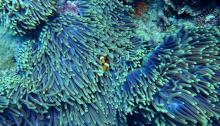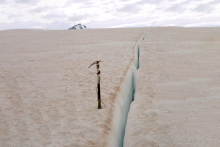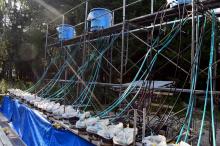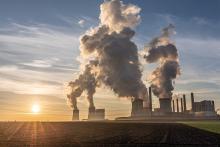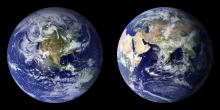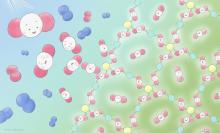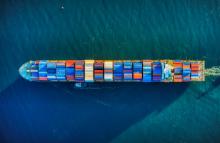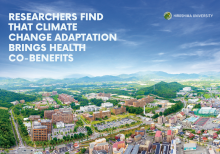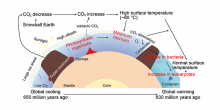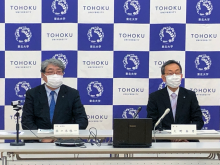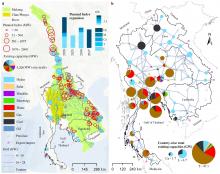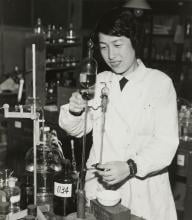Climate Change
News
11 Feb 2022
Low volcanic temperature ushered in global cooling and thriving dinosaurs, Broccoli compound induces cell death in yeast, A single molecule makes big splash in quantum mechanics, Dengue virus makes mosquitos bite more often, and Asia Research News: How it all began, all in the February's Editor's Choice
02 Feb 2022
Researchers from Institute of Industrial Science, The University of Tokyo find that the occurrence of red snow is closely tied to the length of the snow melt season and new snowfall events
31 Jan 2022
Dinosaurs came to flourish during the Jurassic period after a volcanic eruption roughly 201 millions years ago wiped out many marine and land animals, leaving them able to evolve and grow. Now, further details about this eruption and the mass extinction have been revealed. A group of researchers demonstrated how low temperature magma slowly heated sedimentary rocks, causing high sulfur dioxide and low carbon dioxide emissions, a process which cooled the earth.
12 Jan 2022
Predator species may buffer the negative impacts of climate change by mitigating against the loss of biodiversity, according to new research led by scientists in Trinity College Dublin and joined by scientists at Hokkaido University

22 Dec 2021
Scientists predict that continued global warming under current trends could lead to an elevation of the sea level by as much as five meters by the year 3000 CE.
20 Dec 2021
Plant responses to climate change may differ above and below ground, according to a paper published in Nature Climate Change.
16 Dec 2021
In a study published in Nature Energy this month, researchers led by Kyoto University’s Institute for Integrated Cell-Material Sciences (iCeMS) describe how nanodiamond-reinforced composite membranes can purify hydrogen from its humid mixtures, making the hydrogen generation processes vastly more efficient and cost-effective.
13 Dec 2021
The lockdowns introduced in 2020 to curb the spread of COVID-19 saw the narrative “nature is healing” gain prominence. However, the notion that nature, in the absence of people, was healing fizzled out fairly quickly with the emergence of fresh environmental challenges, most notably, the resurgence of single-use plastics. This blog examines the ecological fallout of the pandemic and suggests policy options for Sri Lanka to avert the looming environmental disaster.
05 Nov 2021
Quick seawater test may reveal health of corals, Infectious disease caused by a new nairovirus, Converting CO2 into useful compounds and Automated COVID-19 diagnosis from chest scans all in the November Editor's Choice. Plus our latest podcast: Gender and Conflict in Myanmar.
04 Nov 2021
The diversity of threatened fish in estuaries increases when surrounded by forest cover, whereas estuaries surrounded by farmland show the opposite effect.
25 Oct 2021
Scientists design a novel thermoelectrochemical cell that efficiently converts waste heat into electricity for low-power devices
19 Oct 2021
An ambitious project using cutting edge environmental DNA, known as eDNA, to understand the richness of biodiversity of UNESCO’s marine World Heritage sites launches today.
14 Oct 2021
Climate change may lead to a modest net reduction in global annual energy expenditures by the end of the 21st century, according to a study published in Nature.
13 Oct 2021
The El Niño Southern Oscillation (ENSO) could impact child nutrition in many countries in the tropics, a new study in Nature Communications suggests.
05 Oct 2021
Researchers in Japan have found an energy-efficient way to convert the chief greenhouse gas carbon dioxide (CO2) into useful chemicals. Using the method, CO2 is transformed into structures called metal-organic frameworks (MOFs), suggesting a new and simpler route to dispose of the greenhouse gas to help tackle global warming.
29 Sep 2021
The 10th edition of TechInnovation presents an array of opportunities to catalyse technology transfer and partnerships for business growth.
23 Sep 2021
IPI’s flagship technology brokerage event will spotlight the latest global sustainability solutions from 28 to 30 September 2021.
20 Sep 2021
Võ Quý (31 December 1929 – 10 January 2017) was a Vietnamese ornithologist who studied the destruction of tropical forests and agricultural lands in Vietnam by Agent Orange, a herbicide used by the U.S. military during the Vietnam War.
15 Sep 2021
Anna Mani (23 August 1918 – 16 August 2001) was an Indian meteorologist who contributed significantly to the understanding of solar radiation, ozone and wind energy by developing a wide range of measurement tools. One of India’s pioneering female scientists, Mani excelled in the male-dominated area of meteorology and became the Deputy Director-General of the India Meteorological Department.
08 Sep 2021
Unprecedented declines in merchandise trade, foreign direct investment (FDI) flows, tourism and cross-border migration have all been hallmarks of the economic fallout of COVID-19. As a result, growth expectations for countries worldwide dimmed. Nonetheless, thanks in part to substantial expansionary monetary and fiscal policies being rolled out to achieve pre-COVID economic recovery levels and the development of vaccines, the contraction in global trade and economic output are less than what was anticipated. The Sri Lankan economy too has been impacted by these external developments, witnessing fluctuating fortunes in its external sector performance. This blog discusses the impacts of global economic developments on Sri Lanka’s external sector and suggests ways to cushion them.
03 Sep 2021
Social vulnerabilities of coastal communities and their reliance on blue carbon ecosystem services may be improved by addressing three major factors, according to a study led by Hokkaido University researchers.
03 Sep 2021
The COVID-19 pandemic has increased attention on links between public health and the planet’s health — areas traditionally addressed in separate science and policy circles. Now, an international research collaboration conducted the first comprehensive review of urban climate change responses and potential human health improvements.
30 Aug 2021
On 20 May 2021, Sri Lanka’s worst-ever marine disaster occurred when a fire erupted on the Singapore-registered MV X-Press Pearl container ship just 18 km Northwest of Colombo. While the long-term cost is yet to be determined, the negative impact on industries such as fisheries and tourism, and people who rely on the coastal resources of Sri Lanka is already apparent.
27 Aug 2021
Around 650 million years ago, the Earth entered into the Marinoan glaciation that saw the entire planet freeze. The “Snowball Earth” impeded the evolution of life. But as it warmed, biotic life began to flourish. A research team from Tohoku University has analyzed rock samples from China to tell us more about this transition.
02 Aug 2021
The Research Center for Thin Film Solar Cell, DGIST succeeded achieving the world’s highest PCE of 12.2% for flexible CZTS thin film solar cells.
27 Jul 2021
The university has unveiled a few more details of its new Green Goals Initiative, which includes developing green technology and promoting resilience and social Innovation. It also hopes to achieve carbon neutrality on campus by 2040.
18 Jul 2021
Using a CeO2 catalyst, researchers develop an effective catalytic process for the direct synthesis of polycarbonate diols without the need for dehydrating agents. The high yield, high selective process has CO2 blown at atmospheric pressure to evaporate excess water by-product allowing for a catalytic process that can be used with any substrate with a boiling point higher than water.
12 Jul 2021
Scientists in Singapore are calling for revisions in planned hydropower expansions in light of the rapidly decreasing cost of solar photovoltaic systems
05 Jul 2021
A team of leading climate social scientists, including a chair professor at The Education University of Hong Kong (EdUHK), argues that influential studies that attempt to quantify different countries’ “fair shares” of climate action have put forward a biased and oversimplified view of what is primarily a political and ethical discussion.
Events
Sorry, no events coming up for this topic.
Researchers
Sorry, no researchers coming up for this topic.
Giants in history
Edgardo Dizon Gomez (7 November 1938 – 1 December 2019) was a Filipino marine biologist who recognized the need to protect marine resources, especially coral reefs, in the Philippines.
Anna Mani (23 August 1918 – 16 August 2001) was an Indian meteorologist who contributed significantly to the understanding of solar radiation, ozone and wind energy by developing a wide range of measurement tools. One of India’s pioneering female scientists, Mani excelled in the male-dominated area of meteorology and became the Deputy Director-General of the India Meteorological Department.
Japanese geochemist Katsuko Saruhashi developed the first method and tools for measuring carbon dioxide in seawater


